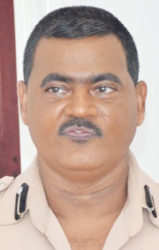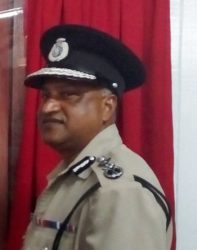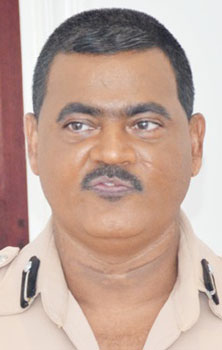Acting Commissioner of Police David Ramnarine yesterday told the Commission of Inquiry (CoI) probing an alleged plot to assassinate President David Granger that the investigation was “lacking” because the suspect’s early release compromised it.
The testimony by Ramnarine, the second-in-command of the Guyana Police Force, is at odds with that given by other law enforcers in relation to the investigations and raises questions about ongoing tensions within the police force.
Ramnarine, asked by attorney Christopher Ram, who represents Imran Khan, the brother of the suspect, to specify to what degree efforts were lacking in the investigation, stated that the fact that the individuals involved in the matter were released the very night they were held for questioning indicated a lack of serious effort.

Evidence before the CoI s that Commissioner of Police Seelall Persaud, while on leave, had directed the officers in charge to release the main suspect in the allegation, Nizam Khan, his brother Imran Khan, and the complainant Andrif Gillard on the very day the allegation was made.
Unlike the testimony presented by Crime Chief Wendell Blanhum, who stated that by the day following Gillard’s report the police had already made significant progress on the matter, Ramnarine said that what was done during initial investigations was just foundation work, which was inconclusive.
Ramnarine, while giving evidence, had stated earlier that when he was briefed on the morning of March 30th on the matter (the report was made on the 29th), Blanhum had told him that he had ordered the suspect’s release.
Asked by the Head of the CoI Paul Slowe whether he himself would have released the individuals had he been informed, Ramnarine exclaimed, “absolutely no!” He added that the police hold suspects for 72 hours for less serious allegations.

Later, under cross-examination, Ramnarine stated that he had not ordered Nizam Khan’s re-arrest although he had the power to do so, because he at that time trusted Blanhum’s judgement, because his competence and professionalism were “above board” in the CID.
Furthermore, he had stated that Blanhum assured him that the persons would return that day for investigations to resume, which he later learnt that they did.
Asked by Slowe whether he has doubts about Blanhum’s judgement now, Ramnarine replied in the affirmative, explaining that he afterwards learnt that the Crime Chief’s decision may have been influenced by Commissioner Persaud, who is known to have a relationship with the Khans.
Ram, in cross-examining the witness, asked him to state aside from the early release of the suspect, in what other way did the Crime Chief fall short in regards to his involvement in the investigation? Ramnarine said that there was nothing else.
Earlier, during Slowe’s examination of Ramnarine, he asked whether he believes that the matter was properly investigated, to which Ramnarine responded that he did not think so, taking into account the circumstances involving the conduct of those handling the matter.
Ram, however, in disagreement with the Chairman’s line of questioning, interjected to express his view that Slowe had been “crossing the line” by asking what he described as leading questions.
Slowe said that he had noted the lawyer’s concerns.
The investigation
After receiving a report of the plot allegation from the Crime Chief on March 29th, Ramnarine, acting as Commissioner of Police at the time, said he instructed Blanhum to “spare no effort” in immediately launching a thorough investigation into the matter.
The Minister of State Joseph Harmon was contacted that very day and informed about the matter and that evening Ramnarine received information that the President was requesting a brief the next day.
Ramnarine recalled that during his morning briefing on March 30th, he had had to enquire about the probe from Blanhum, noting that he would have thought that the investigation would have been the first thing he would mention. It was then that the Crime Chief told him that Nizam Khan had been released, and when he asked on whose authority, Blanhum stated it was his own.
Attorney Selwyn Pieters, during cross-examination, asked Ramnarine if at any time he felt misled by the Crime Chief after learning that the Commissioner would have had some dealing in the Khans’ release, to which he replied, “obviously so.” He added that he felt badly about the situation.
Ramnarine had earlier told Ram that the only time he seeks the advice of the Commissioner while he is on leave is if he dealt personally with the matter, and so his insight, or “train of thought” was needed in pursuing it.
Ramnarine also stated that during a meeting with officers, he had cause to raise concerns that the police were being “lethargic” and “unprofessional” in their approach to the investigation and related to them that he was made aware that some senior officials were involved in the release of the Khans on the night of their detainment.
“There and then I asked the Crime Chief, I said, ‘Are you aware of information that suggests that senior officers have made attempts or were in some way involved in the very early stages when Nizam Khan was arrested?’” Ramnarine related.
He said that Blanhum had asked for the officers to be pointed out, and that the Head of the Special Branch had stated that the Commissioner made a call that night. Blanhum’s and Mitchell Caesar’s names were reportedly also mentioned.
“I cautioned everyone in that room that we are a professional organisation and the fact that names can be called in such an important matter, it challenges our professionalism and I urged everyone to redouble their efforts. I reminded the Crime Chief of my previous instruction to him on the morning in question that he himself must oversee such an investigation,” he stated.
He recalled that the week after this meeting, he had been preparing a report along with the Deputy Crime Chief when, he, sensing that something was lacking content-wise, asked to be provided with the last bit of legal advice they had received.
He stated that the police legal advisor had recommended that investigations into Commissioner of Police Persaud’s call be done. Ramnarine said that he had this information transmitted to President Granger.
Meanwhile, attorney Ian Chang, following Ramnarine’s testimony, stated that he had been put in an “embarrassing position” and though he is representing the interests of the force, it would probably be best for Persaud to have his own representation.
Slowe stated that the commission was in receipt of correspondence which indicated that such might be the same.
On Monday, Inspector Prem Narine, who took over the reins of the investigation on the ground on the evening of March 29th, testified that he had received the instruction to release Gillard and the Khans directly from the Commissioner of Police.
Narine had indicated that all three men had been taken into custody because there were allegations made amongst them while there that they had threatened each other.
Further, according to the testimony of Constable Jermaine Laundry, it was on this instruction that bail was granted to Nizam and Gillard, and that the Khans were able to repossess their firearms, which, in Imran’s case, had only minutes before been lodged.
“I can’t recall the exact time I received a call from the Commissioner of Police, Mr Seelall Persaud. He asked me what was happening in relation to the matter. I told him there was Imran Khan at the station behaving in a certain manner. I told him that we have his brother, Nizam Khan, in custody in relation to the allegation…,” Narine stated.
“…He then instructed that I send Mr Imran Khan on his own recognisance and place the other persons on bail. As a result of that and the fact that Mr Persaud was on leave at the time, I called Mr [Mitchell] Caesar and I told him what the instructions were. He then told me that I should carry out those instructions if the commissioner said so,” Narine stated.
Narine said that had he not been advised to release them, the men would have remained in custody because of the nature of the allegations. Asked if he believed the instructions were inappropriate given the fact that Persaud was on leave at the time, he said it was something he had considered and that was why he informed Caesar.
Caesar, when he testified on Monday, corroborated Narine’s story. He, like Narine, related that had it been of his own accord, the men would have remained in custody, given the nature of the allegations.






